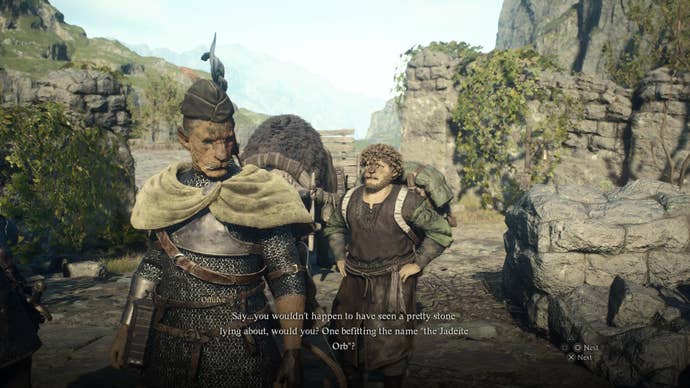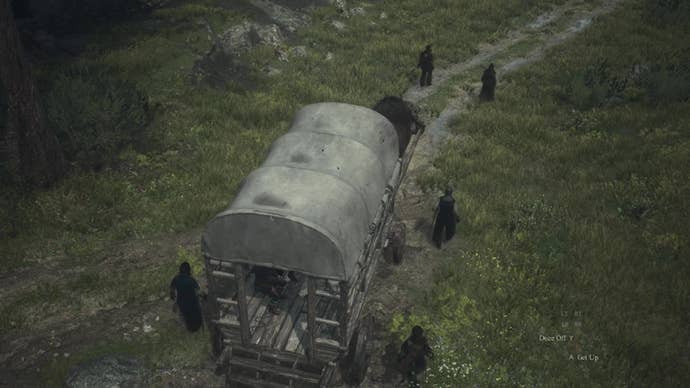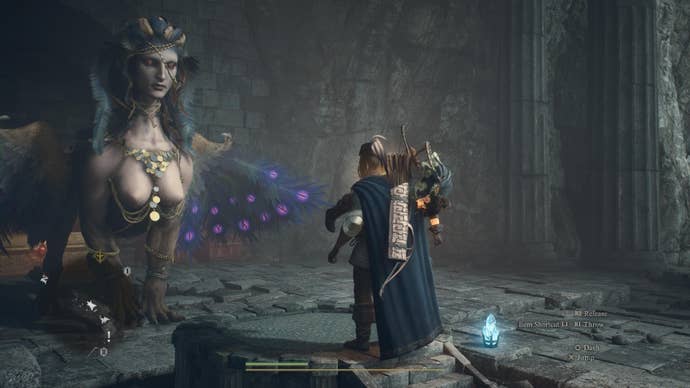Products You May Like
Dragon’s Dogma 2 is the kind of game major publishers just do not make anymore. The sort of divisive project that’s so thoroughly committed to its bit, you’re either on board with it or you’re out. Even if you may not be thrilled with every decision made to get it there, you have to at least appreciate its gusto.
Lucky for me, I am as on board with its madness as I am fascinated that Itsuno and co. managed to convince Capcom to give them the money and development time needed to bring it all to life.
If I want to be flippant or reductive, I’d say Dragon’s Dogma 2 is a game that isn’t concerned with your feelings about it. The vast majority of big games today are built to enshrine you as the only character that matters before you could even press a single button. The world, its people, the systems that govern it are all made specifically for you to experience. Outside that context, they’d have no reason to exist, and no purpose of their own.
Dragon’s Dogma 2, however, has an entirely different approach. It’s still a game, sure; meant to be played and everything, but it wants you to seek out the experiences it holds. It wants you to fail, miss out on content because you didn’t get a subtle hint some NPC you met two hours ago dropped, or even finish the game without knowing that certain quests and relationships could’ve played out entirely differently had you been a little bit more experimental.
This is a game that wants you to beat a path to its fun, because it’s in that journey that you’ll fall in love with it. My favourite games are those whose possibility space allow for, and expect, failure. In that sense, failure is not something to avoid, it’s built right into the way designers want you to play them.
Consider this: elaborate minimaps, plentiful ways of quick travel, and detailed quest logs are all objectively useful features. In fact, in the upper echelon of big-budget games, they’re expected features. So why does a game like Elden Ring eschew most of those and still create a compelling open world? Put a different way, why do games with thousands of lines of dialogue, quality voice acting and expensive cutscenes can still fail to create memorable moments or tell stories that sit with you?
Yes, it objectively takes longer to traverse on foot across the world of Dragon’s Dogma 2 than, say, Rise of the Ronin. And it’s true that your other means of speeding up those treks all come with their own risks and inconveniences.
Hiring an Oxcart costs money; they can be ambushed, or even break if a griffin happens to descend upon you and ruin your day. And just like most FromSoftware games, it can get frustrating to have no clue where to go to find something needed for a quest, or forget about a crucial choice alluded to hours earlier because you couldn’t refresh your memory with a quest log.
All of these are valid reasons why many players simply won’t find Dragon’s Dogma 2 “fun”, because their expectations are based on the games they play, and what are loosely industry standards. But none of that makes Capcom’s approach here any less valid. In fact, the game’s best moments are born out of this obfuscation and the ways in which you’re forced to engage with the game’s inconvenient systems.
This is the attitude indie games are great at adopting, which makes it all the more surprising and refreshing to see a major release like Dragon’s Dogma 2 display it.

Alan Wake 2 was one of my favourite games of last year, but I’ll never get over how disappointing one of its core mechanics was. You play half of the game as a detective, so it makes sense that there would be a place for you to return to after every field mission where you can collate your thoughts and sift through the information you’ve gathered. Detective work relies a lot on connecting dots and examining mundane details.
But Alan Wake 2’s red-threaded board fails at offering you that feeling, because it boils down to picking the right photo, observation or insight and slotting it into its predetermined place. There is only one place everything can sit. It robs you of the feeling of failure, and takes away any agency you might have had in forging this failure.
Shadows of Doubt is another detective game that came out last year, with its own evidence board. Except, of course, it let you make bad choices. You still needed to gather evidence and do all the detective work, but you could end up arriving at entirely the wrong conclusions, despite having the “right” pieces of evidence; despite doing the work. This is how one game can thrive where another fails.
So yes, a crucial NPC in Dragon’s Dogma 2 is not going to be standing around waiting for you to visit and press A to pick up where you left off. And yes, you’re going to come across obstacles that seemingly don’t have any way for you to overcome them, leading you to leave thinking you’re not supposed to be able to. And, of course, certain moments will feel unfair because the world plays by its own rules.

All of that is what makes your choices in Dragon’s Dogma 2 feel organic. You feel clever when you climb a wall to shoot off a weight holding a gate shut, or forge an item you were asked to bring rather than actually finding the real thing. Just as it can be frustrating to come across a flying enemy you can’t kill because your party has zero ranged options, you’re going to feel extra powerful when you run into an entirely grounded giant.
Dragon’s Dogma 2 is not a toy box; it’s an escape room with no attendees and no orientation session. If you choose to get locked in, you’re going to need to rely on your wits to find your way out. But once you do, it’s going to feel more fulfilling, and it’s not one you’ll soon forget.
